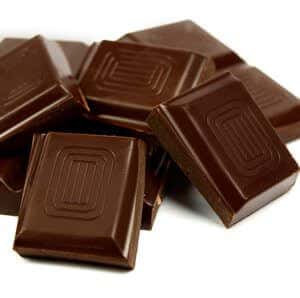
One previously forbidden treat that people need not avoid any longer is chocolate, so long as it doesn’t contain any hydrogenated vegetable oils (trans fats). A new study confirms previous suspicions that eating chocolate can reduce the risk of heart disease.
Scientists at the University of Aberdeen in Scotland collected dietary data from more than 20,000 people in the course of 12 years. Approximately 20 percent of these folks never ate chocolate. Those who ate between 7 and 100 grams (about 3.5 ounces) daily had an 11 percent lower risk of developing cardiovascular disease and a 25 percent lower likelihood of dying from a heart attack.
The study isn’t perfect, though. (What study is?)
The people who ate chocolate most regularly were younger and more physically active. These factors might have been as important as the effects of cocoa flavanols in protecting their heart health.
The authors concluded, a bit primly, that
“There does not appear to be any evidence to say that chocolate should be avoided in those who are concerned about cardiovascular risk.”
We’ll definitely go beyond that. After all, cocoa flavanols have been shown by other researchers to make blood vessels less stiff (Age, June 15, 2015) and help them relax (Archives of Biochemistry and Biophysics, Nov. 15, 2014). These compounds also help keep blood platelets from clumping together to form unwanted clots (Clinical and Developmental Immunology, March, 2005). Some studies show that cocoa flavanols can help lower blood pressure and improve cognition (American Journal of Clinical Nutrition, March, 2015).
What Is the Best Chocolate?
If you are consuming cocoa flavanols purely for their health benefits, ideally you would go for a supplement such as CocoaVia. Its powder packets contain 375 mg of cocoa flavanols and the unsweetened ones contain no sugar or artificial sweetener, so there’s no worry about excess calories.
Most people do like chocolate, but healthcare experts worry that some might overdo, particularly on chocolate that contains a lot of sugar. ConsumerLab.com did evaluations on several types of dark chocolate. Baker’s Unsweetened Baking Chocolate came out well, especially in a comparison of flavanols to calories. (The unsweetened chocolate has no sugar to add extra calories.) Endangered Specides Natural Dark Chocolate 88% also did well, as did Ghirardelli Chocolate Intense Dark 72%.
In general, dark chocolate is a better source than milk chocolate, which dilutes the flavanol-containing cocoa solids with milk solids and more sugar. But the percent cocoa on the label doesn’t always tell the story.
The idea is to indulge in some chocolate on a regular basis-but not so much that you start to gain weight. And relax: this indulgent treat is actually good for you!

